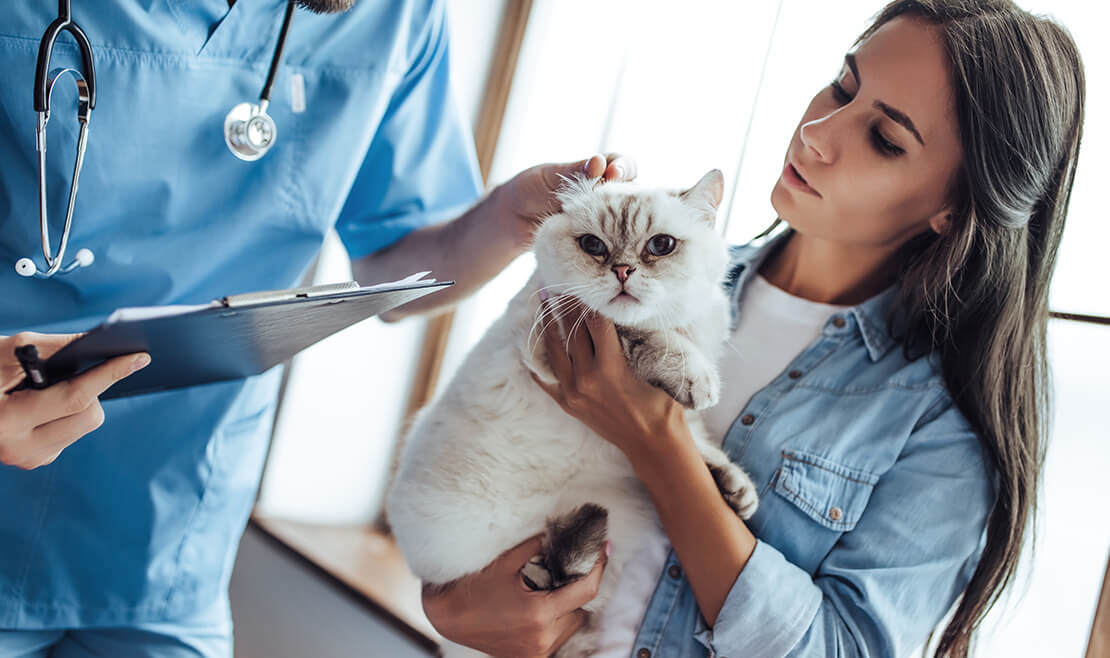How often should cats visit the veterinarian?
Published September 14, 2019


Cats need veterinary care, too, and the best way to keep your cat healthy is with an annual wellness exam. A wellness exam should include a physical nose to tail exam along with diagnostic testing, including blood, urine, and intestinal parasite tests to help detect the early stages of disease.
Wellness exams vary depending on the age and health status of your cat. Just like when you visit your doctor, you will complete a preliminary checklist with the veterinary assistant that will describe your cat’s health condition. The checklist will ask about any issues your pet may have. For example, if you noticed that your cat is losing weight, the veterinarian may perform special tests to identify potential diseases that can cause weight loss.
Most wellness exams include a complete physical examination, which is a nose to tail inspection for any abnormalities. The veterinarian will use special equipment to do this, including a stethoscope to listen to the heart and lungs, an otoscope to view the inside of the ears, and an ophthalmoscope to examine the eyes. Your veterinarian will also feel all over your pet’s body for lumps and bumps. Also, during the wellness exam, your veterinary team will check your cat’s body temperature and weigh them.
Cats should receive their recommended vaccinations that are due during the wellness exam. The core (FVRCP) vaccine series should begin at 9 weeks of age, followed by booster visits at 12 weeks and 16 weeks of age. The core vaccine will then be administered every 1-3 years, depending upon your pet’s vaccine history.
All kittens should receive a FeLV/FIV test at the start of the kitten vaccines series, with feline leukemia vaccines at 9 and 12 weeks of age. After that, cats that are at-risk for feline leukemia, including indoor-outdoor cats, should receive the feline leukemia vaccine every 2 years.
A rabies vaccine should be administered at 16 weeks of age during the kitten vaccine series. After that, cats will receive a rabies vaccine ever 1-3 years, depending upon their vaccine history.
Veterinarians recommend at least 2 intestinal parasite tests during the kitten vaccine series, with at least 1 test annually after that.
Intestinal parasite tests are recommended at your pet’s routine wellness exam. Your veterinarian may request that you bring in a sample of your pet’s stool to the visit for analysis, which will be sent to a reference lab for comprehensive testing. Results usually come back within 24-48 hours. The veterinarian will often recommend blood and urine tests as well. The blood test will include a complete blood count (CBC) and a chemistry panel. These tests can determine if the pet has problems such as anemia, infection, or organ disease. Other tests, such as a thyroid evaluation, may be helpful, depending on the physical examination and patient history. Comprehensive lab testing is recommended for all cats 7 years and older.
If your pet receives a urinalysis, the urine is analyzed for presence of bacteria, cells that fight infection, blood, and crystals, any of which may mean that there is a problem. The urinalysis will also let you know if the kidneys are functioning properly by being able to concentrate urine.
To make wellness care easy, our vaccine and wellness packages provide great value and no hidden costs. There’s no need to wait on an appointment. Check in for a same-day visit to be placed in the next spot in line.



